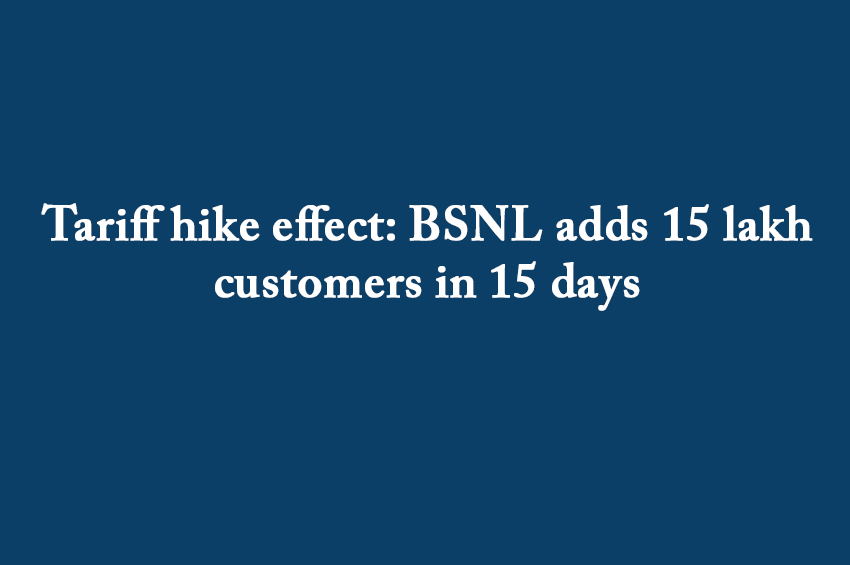Winning Bizness Desk
Mumbai. After the 25% hike in tariff by private mobile companies from July, Achche Din for Bharat Sanchar Nigam Limited (BSNL) are back. Ever since other mobile companies have increased their rates, people have started switching to BSNL. The state owned operator, which had more than 18% share in the Indian telecom market two decades ago, has now seen its current share of less than 2.5%. But people have started returning home. Notably, BSNL had gained 15 thousand new customers in May, while in June it went down by 58 thousand. However, now the situation is changing as this company has added more than 15 lakh customers in the first 15 days of July. In the last 8 years, 76% customers (7 crore subscribers) were lost. Bur, now 6.34% new customers have been added in 15 days. Telecom experts say that BSNL has upgraded more than 25 thousand towers. Apart from this, the process of installing 20 thousand new towers is underway. This has improved the services. As a result, new customers have started increasing rapidly. But in terms of data speed, voice quality, coverage area, the government company is still much weaker than the private players. There is still a long way to go to compete with private companies.
4G service from August
From August this year, BSNL will start 4G service across the country which will be completely based on indigenous technology. This indigenous technology has been developed by a consortium in partnership with IT company Tata Consultancy Services and telecom research organization C-DoT. Using this, BSNL has started 4G service in Punjab and has also added about 8 lakh customers. BSNL officials have claimed a maximum speed of 40-45 megabits per second on the 4G network, which has been launched in the premium spectrum band of 700 megahertz (Mhz) as well as the 2,100 MHz band during the pilot phase. According to the report, C-DOT's 4G technology core is performing very well in the BSNL network in Punjab. It was installed in July last year. 'It takes 12 months to prove the success of such a complex technology, but the C-DOT core has been stabilised in just 10 months. TCS, Tejas Networks and state-owned ITI have received orders worth about Rs 19,000 crore from BSNL to deploy 4G networks. This network can be upgraded to 5G later.
BSNL is in fast forward mode
BSNL is in fast forward mode now and plans to install 1.12 lakh towers for 4G and 5G services across India. The company has installed more than 9,000 towers for 4G service across the country. More than 6,000 of these towers are in Punjab, Himachal Pradesh, Western Uttar Pradesh and Haryana circles. An official said that 'BSNL has been selling only 4G-enabled SIMs for the last 4-5 years. In such a situation, only those customers will have to remove the old SIM and get a new SIM to experience 4G service.' PM Modi has launched the roadmap for the 6G network. 6G service is expected to start in India by 2030. BSNL is lagging far behind in this matter. The company is preparing to launch 5G service along with 4G. In January 2023, Union IT and Telecom Minister Ashwini Vaishnav had said that BSNL would start its 5G service by April 2024. At the same time, Airtel and Jio launched 5G service in India in October 2022.
BSNL was once the number one mobile operator
Former Prime Minister of India Atal Bihari Vajpayee launched BSNL mobile service from Lucknow on 19 October 2002 and in just 1-2 years of its launch, it had become India's number one mobile service. Private operators had started mobile services months before the launch of BSNL, but the demand for BSNL's 'CellOne' brand had increased significantly. When BSNL services started, private operators used to charge Rs 16 per minute for calls and Rs 8 per minute for incoming calls. BSNL made incoming calls free and the price of outgoing calls came down to Rs 1.5 per minute. This period of 2002-2005 was the golden period of BSNL when everyone wanted a BSNL SIM card. There were 3 to 7 kilometer long queues for this. After its establishment in the year 2000, BSNL officials wanted to start mobile service as soon as possible to challenge the private operators, but they did not get the necessary government approval. Between 2006-12, while there was a slight increase in the capacity of BSNL, the private operators went far ahead.


